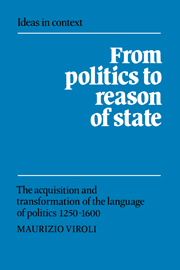 From Politics to Reason of State
From Politics to Reason of State Book contents
- Frontmatter
- Contents
- Acknowledgements
- Dedication
- Introduction
- 1 The acquisition of the language of politics
- 2 The philosophy of the city and the political man
- 3 Machiavelli and the republican concept of politics
- 4 Francesco Guicciardini: between politics and art of the state
- 5 The last glimmerings of civil philosophy
- 6 The triumph of reason of state
- Epilogue. Politics as civil philosophy
- Bibliography
- Index
- IDEAS IN CONTEXT
1 - The acquisition of the language of politics
Published online by Cambridge University Press: 02 February 2010
- Frontmatter
- Contents
- Acknowledgements
- Dedication
- Introduction
- 1 The acquisition of the language of politics
- 2 The philosophy of the city and the political man
- 3 Machiavelli and the republican concept of politics
- 4 Francesco Guicciardini: between politics and art of the state
- 5 The last glimmerings of civil philosophy
- 6 The triumph of reason of state
- Epilogue. Politics as civil philosophy
- Bibliography
- Index
- IDEAS IN CONTEXT
Summary
Even though the words “politics” and “political” were absent from the documents of popes, kings and feudal lords, the Middle Ages maintained some relics of the classical language of politics. Philosophers, erudites and theologians of the twelfth century knew of a science of politics and discussed political virtues. References to political science appear in the context of comprehensive classifications of sciences or encyclopedias, while political virtues were mentioned within broader analyses of the various types of moral virtues and their relative merits. Inserted in a new intellectual context, the words and idioms of the classical language of politics were almost unrecognizable, like pieces of a Greek or Roman temple disseminated within the stones of a gothic palace. It is only in the thirteenth century that the scattered ruins of the Athenian and Roman wisdom were elaborated to form a coherent and shared language of politics as art of the city and a recognizable image of the political man. The historical context of this renaissance was e experience of the free city-republics that flourished in the Regnum Italicum in the eleventh and twelfth centuries. Although the language of politics that became conventional by the end of the thirteenth century was not the exclusive ideology of republican or popular governments, the main political challenge that stimulated its rebirth was the institution and the preservation of free cities against the threats of tyranny.
Three major intellectual traditions cooperated in the work of reconstructing the language of politics: the tradition of the political virtues, Aristotelianism and Roman law. In the subsequent chapters, I shall try to interpret the contribution of each of them and illuminate their complex interplays.
- Type
- Chapter
- Information
- From Politics to Reason of StateThe Acquisition and Transformation of the Language of Politics 1250–1600, pp. 11 - 70Publisher: Cambridge University PressPrint publication year: 1992


